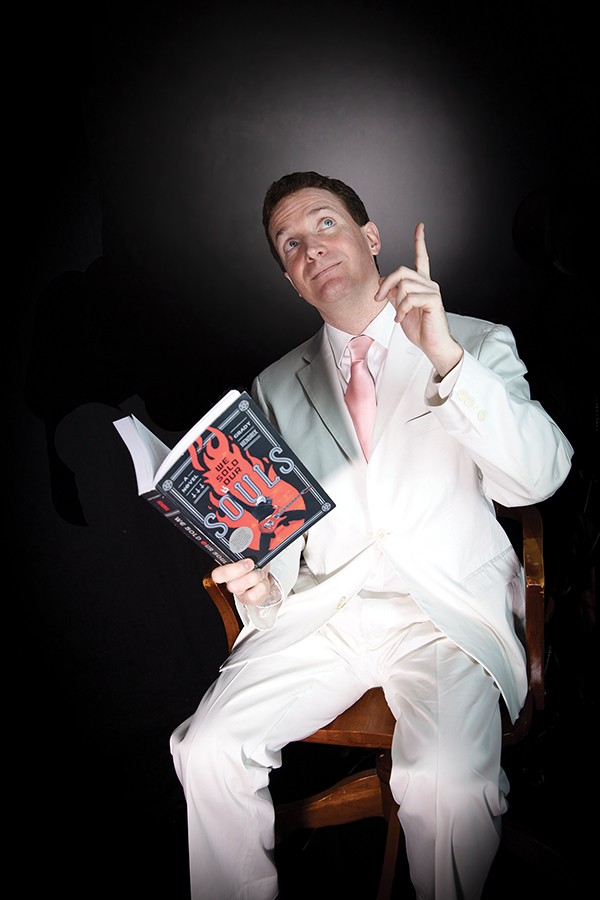Grady Hendrix, the author of Horrorstör and My Best Friend’s Exorcism, is an animated speaker. It’s easy to picture him sitting near an open window in his home in New York, leaning forward as he tells me over the phone about the guitar lessons, the solo speaking engagements, and the rewrites that went into his newest novel, We Sold Our Souls (Quirk Books).
The supernatural thriller tells the story of washed-up metal band Dürt Würk from the point of view of lead guitarist Kris Pulaski. After two albums recorded on a shoestring budget and countless cross-country tours measurable only in gallons of gas burned and number of bottles smashed onstage, Dürt Würk crafts their magnum opus, a concept album called Troglodyte. Then, when Terry Hunt, the band’s vocalist, gets them kicked off a tour, he decides to bury Troglodyte deep in the vault, and he convinces the band to sign over their rights to the band and its albums, to unknowingly sell their souls.

Grady Hendrix
“In a modern-day context, what’s selling your soul?” Hendrix asks. “With the medieval idea, you sold it to Satan. That’s conspiracy theories now. It’s this idea that there’s a secret 1 percent who control the world, and if you get in league with them, they will overcome all obstacles and you’ll be successful, not because you’ve earned it, but because you paid some price to join this cabal.”
Hendrix spent time with the conspiracy community, which, he says, can feel as if “you were beaten by the secret forces that run this world before you got out of bed, before you were even born.” But Hendrix had the antidote to defeatism right in front of him: “Bands are the most hopeful thing in the world. Nine out of 10 bands know they’re never going to make it big, but they’re up there on these stages throwing messages in bottles out into the ocean. And they will never see the beaches those bottles wash up on.”
Troglodyte is that message in a bottle. It’s a key for deciphering the novel and the only weapon at Kris’ disposal. “A lot of times, we rescue ourselves from terrible situations, we just don’t realize it. You’re in the past firing a bullet into the future that saves you and kills the monster. I wanted Troglodyte to be that,” Hendrix says. “Kris, when she was really connected to what she was doing and just doing it for the love of it, she tapped into whatever this is — the collective unconscious, Black Iron Mountain — and encoded this message to herself in the future.”
The novel plays out as a dark riff on the reunion tour trope. More than a decade after Terry dissolved Dürt Würk and shelved Troglodyte, Kris tries to reunite her old band and to understand the importance of the album they never released — and of Black Iron Mountain, the shadowy force haunting the pages of the book, dogging Kris as she hurtles toward a reunion.
“The supernatural gives you a chance to literalize things that are hard to define but that are feelings everyone has,” Hendrix says. “Black Iron Mountain isn’t real, but as a metaphor, there are these forces that are bigger than we are and older than we are. They want us to not be weird and just be ashamed of ourselves, and I think it’s hard to resist them.”
Hendrix talks about social media influencers and branding in the entertainment industry, saying “you have to flatten yourself. You have to get rid of all the weird stuff, all the contradictory stuff that makes us people.” He thinks the pendulum is swinging the other way, though, that people crave authenticity.
Hendrix says his previous novel got the best response when he “cut closest to the bone” and was honest about his most embarrassing moments, which inspired him when writing We Sold Our Souls. “There is this emphasis on cool, but I prefer enthusiasm. Enthusiasm is hot. Sometimes it makes you get carried away and forget the social niceties, and you can look a little nuts. But cool is removed and remote. Life is hot; corpses are cool.”
We Sold Our Souls is a redemption song in a minor key. The reader can’t help but hope Kris can pull off one last tour, a final road trip to salvation. Hendrix conjures the anguish of betrayal and the frustration of powerlessness in this novel about what passion is worth and how long to keep fighting to keep it alive in a world of pragmatic cool.
More information about We Sold Our Souls at www.gradyhendrix.com.